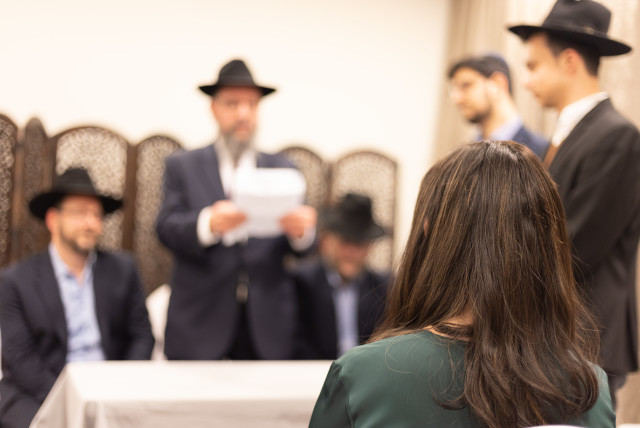Jewish law tells us IDF soldiers must grant divorce before going to war - opinion

JEWISH LAW LIVE: Authorizing a rabbinic court to protect the welfare of the spouses of IDF soldiers and reservists is very much needed.
Israel is unfortunately dealing again with cases in which our enemies have kidnapped soldiers, dead or alive, and demanded ransoms for their return. In past cases, such as that of Ron Arad and Ehud Goldwasser, the captured soldiers were married, thereby raising the possibility that their wives would remain married indefinitely (agunot) until the fate of their husbands was legally determined. This tragic phenomenon has led to renewed discussion over the wisdom of composing halachic divorces before military service.
According to the Talmud, all soldiers in King David’s army issued a divorce document (get milhama) before going out to war. In fact, one medieval commentator even asserts that such practices may be found in Moses’ battles in the Torah. Jewish law has always been concerned with the fate of spouses waiting on the home front.
In one scenario, a husband without children may be killed in action and thereby leave his wife chained to his brother through levirate marriage (yibbum). Another concern was for him to be captured or declared missing in action, thereby leaving his wife’s status in limbo. These wartime divorce writs were sometimes called “divorces of love,” as they represented the husband’s concern to protect his wife’s interests in case he met a tragic fate.
Medieval commentators debated how such a divorce mechanism works. Rashi contended that the document is written as a conditional divorce: Should I die, the divorce will work retroactively from the time of its composition. This formulation prevents a husband from formally separating from his spouse, a demoralizing prospect while heading off to war. However, it creates many problematic situations by leaving their status in limbo.
How does one decide when the divorce should kick in – only if the soldier is killed in action, or also if he goes missing? If the latter, when do we declare the spouse as MIA? What happens if the spouse is known to be alive in captivity but without any foreseeable chance of freedom? Such conditional divorces leave many questions open, which is why many medieval decisors were against employing them in other circumstances as well, such as when husbands embarked on extended trips across dangerous oceans.

DUE TO these problems, Rabbenu Tam asserted that the soldier should issue a full-fledged divorce, with both sides agreeing that they would remarry upon his safe return. This method seems to be have been the most popular throughout the ages and was also used in cases of spouses traveling abroad or wanting to divorce their wives on their death beds to prevent yibbum (the brother being encouraged to marry the widow).
This solution, however, might be quite demoralizing for both spouses and destabilizing for their relationship. (In fact, according to one Talmudic opinion, King David took advantage of this situation to fraternize with Batsheva, the wife of one of his soldiers.) Moreover, it created problems in situations where a husband might return on a temporary furlough yet no longer be technically married. Furthermore, it would not work for kohanim (priests), who are not allowed to remarry their divorcees.
For many centuries this question remained largely theoretical, since Jews did not serve in foreign armies. However, as Rabbis Yosef Zevin and Shiloh Refael have documented, the issue re-emerged in the modern era once Jews were drafted into armies that had protracted battles in far-flung territories.
Numerous responsa indicate that rabbis helped draft such wartime divorces during the Russo-Japanese War, as well as World War I and World War II. On many occasions of mass inscription, there was insufficient time to write personalized divorce documents for each soldier. Instead, the soldiers signed documents that authorized so-and-so scribes and witnesses to issue their wives a divorce if they didn’t return home by a certain date.
While these documents raised some legal questions, they held the distinct advantage of not requiring an actual divorce writ to be written until the question of remarriage emerged. As such, generic documents were made available during World War II by the Agudat Rabbanim in America and the Chief Rabbinate in Israel.
FOLLOWING THE creation of the State of Israel, IDF chief Rabbi Shlomo Goren prepared similar documents for Israeli soldiers at the behest of Israeli chief Rabbis Isaac Herzog and Ben-Zion Uziel, who asserted that signing such documents should be mandatory for all married IDF soldiers. Similarly, Rabbi Eliezer Waldenburg attests that he prepared such a document for an Israeli soldier who was performing covert operations preceding the Six Day War.
However, as professors Amihai Radzyner and Dror Fixler have documented, the IDF no longer offers such documents. Rabbi Goren later asserted that we can’t impose these documents on soldiers, who might not want to sign them out of fear that it would impact their widow’s military benefits. He further feared they would have a demoralizing effect on their state of mind, a point that has recently been reinforced by Rabbi Asher Weiss. Others have also argued that with increased technology and communication, we no longer have the problem of not knowing a soldier’s fate.
Ramat Gan Chief Rabbi Yaakov Ariel, however, has countered that, especially given the increased threat of captivity, married soldiers should have this option. Soldiers already sign a form to authorize bereavement payments to their chosen loved ones while fingerprints and dental imprints to identify their bodies are being taken. If that doesn’t harm morale, then neither should authorizing a rabbinic court to protect the welfare of their spouse. In fact, it might give them greater reassurance.
I believe that such an option should be made available to married IDF soldiers and reservists, who can choose if this is the best option for them.
The writer is the executive director of Ematai and author of Ethics of Our Fighters: A Jewish View on War and Morality (Maggid).
